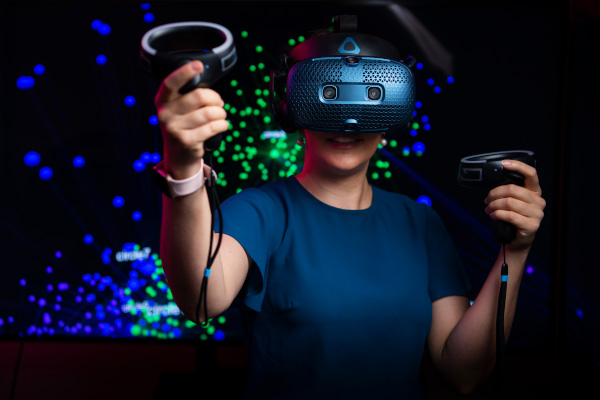The Psychology of XR
COURSE INFORMATION
DATES AVAILABLE
15 July 2024
CONTACT HOURS
35 hours for the week
MODE
In person
FEES
No cost to participants
LOCATION
Mawson Lakes Campus
Course Overview
To create compelling Augmented Reality (AR) and Virtual Reality (VR) experiences it is important to have an understanding of human perception and psychology. AR is designed to create the perceptual illusion that virtual objects are in the real space, while VR aims to create a strong psychological feeling of Presence or immersion in a completely virtual space.
In this short course attendees will learn about the psychological aspects of XR experiences and have the opportunity for hands-on experimentation with sensors designed to measure cognitive, behavioural and physiological measures.
The aim is to provide enough background so that attendees have a deeper understanding of the psychology of X and have the skills to develop XR systems that can respond to human physiological, cognitive and behavioural cues.
Topics reviewed include:
- Foundations of human perception
- Cognitive aspects of XR
- Capturing physiological input in XR
- Models of emotion
- Simulator sickness
The course is being offered by The Australian Research Centre for Interactive and Virtual Environments (IVE). A world leader in Augmented Reality (AR) and Virtual Reality (VR) with research spanning across computer science, engineering, neuroscience, art, architecture, and design. Responding to the challenge of increased demand for AR and VR technologies globally IVE researchers are leaders in many areas of AR and VR research including wearable computing, interface design, empathic computing, 3D visualisation, perception, and telepresence.

Why the Psychology of XR ?
It is important to have an understanding of human perception and psychology when creating AR and VR experiences.
At the end of the course students will have a greater understanding of:
-
foundations of human perception in XR
-
cognitive aspects of XR
-
capturing physiological input in XR
-
analyzing physiological data from XR
-
using models of emotions in XR
-
simulator sickness in XR
-
designing and conducting XR user studies
-
analyzing results from XR user studies
-
including physiological input into XR systems
-
other related elements of the psychology of XR
![]()
Who should apply?
The program is highly recommended for
- HDR students studying at UniSA
- HDR students from another university in Australia or New Zealand
- Industry experts who create AR or VR experiences
This course will be of interest for those wanting to get a deeper understanding of the psychological aspects of XR, and will be useful for jobs as a researcher in XR, an XR experience designer, XR developer, or in roles where XR is being use for real world applications or to support research.
For HDR students this course relates to the disciplines of Psychology, Computer Science, Engineering, Art and Design, and related topics.
Course structure
In this short course attendees will learn about the psychological aspects of XR experiences and have the opportunity for hands-on experimentation with sensors designed to measure cognitive, behavioural and physiological measures.
This intensive course is a combination of keynote presentations, formal lectures, and hands-on project work. The course will be delivered at Mawson Lakes campus, with students taking part in group discussions with lecturers and students and participating in practical activities.
Attendees should plan on being in the course from 9am - 5pm each day for the whole week. Around half of the time will be taken up with lectures where various foundations of the psychological aspects of XR will be covered. In the afternoon, the attendees will work in small groups on projects designed to give them hands-on experience with integrating physiological sensors into XR applications.
The course culminates with a demonstration session at the end of the week where people can show the prototype applications developed.
The table below provides you with a snapshot of what to expect during the week.
How to apply
Register your interest with your contact details and we’ll be in touch.


